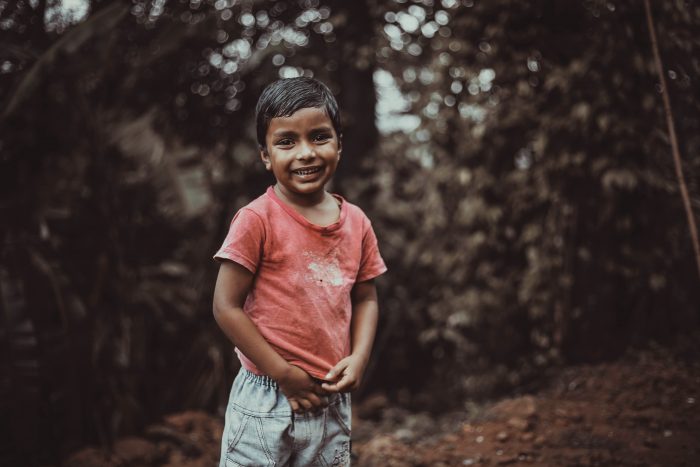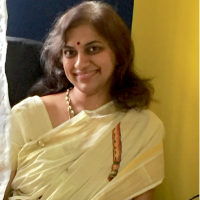It all started with one little boy who ran into me during the initial days of my life in Bangalore.
I was walking around the block for my morning exercise, and he was waiting for the school bus. Hyperactive, he started running hither and tither, and literally into me. His parents apologized profusely, explaining that he had a special need and couldn’t control himself. I responded that it was no problem, and that everyone has difficulties controlling themselves, and that yoga could help. Turns out, they had been looking for a yoga teacher for him.
The boy, around age seven, started coming to my place where I had a small yoga studio office. He would bounce off walls and climb up and down bookshelves. He was unstoppable. I like to think of him as Superman, Spiderman, and Batman, rolled into one. Unable to sit still or complete a sentence, we delved into a yoga practice—or at least tried to.
New to the field of teaching yoga for special needs, and new to special needs, I didn’t have any preconceived notions about what I should or shouldn’t do, or what to expect. I just gave him my full attention, while being loving and kind, firm and stable. I did what I thought was best for him, made up little games and songs to keep his focus and attention. We used basic practices such as asanas, pranayamas, relaxation techniques, and positive affirmations.
Yoga did its work internally. A few months later, we were sitting in vajrasana, a practice used for focus and stability. After what seemed like forever, I suddenly opened my eyes and looked at him. He wasn’t moving.
I was scared. That wasn’t his normal manner! I was used to him moving, twitching, chattering nonsensically.
I was so worried that something I instructed had gone wrong. Was he still breathing? Check. Then what was the matter? I asked him, “Are you okay?”
This boy, diagnosed with Attention Deficit Hyperactivity (ADHD), replied in a rather relaxed voice, “I am calm.”
Presto! The boy had internalized the meaning of calm and understood that he was experiencing it—all while practicing yoga.
This boy, who previously could not stop for even one second, let alone one minute, was holding vajrasana—completely still, completely silent, eyes closed, mouth closed, for longer than most adults can.
This was the start of Prafull Oorja.
A registered trust in the state of Karnataka, over the last decade, Prafull Oorja has touched the lives of thousands of children and women across India through the philosophies and practices of yoga.
I soon found other students and schools who wanted to positively impact their special children through yoga. I started giving talks and workshops to parents and special educators, raising awareness on yoga’s capacity to transform the lives of such children.
Realizing that I wouldn’t be able to handle all the requests from across the city and country, I recruited more yoga teachers to join hands through a grassroots nongovernmental organization (NGO), Prafull Oorja Charitable Foundation.
With a base in Bangalore, our uBloom Yoga Therapy program has worked with 20 schools for special needs across the city, many of them utilizing our services repeatedly every year.
Each week, over 300 children with a wide variety of symptoms and diagnoses (ranging from autism and down syndrome, cerebral palsy, to learning conditions such as dyslexia, speech and hearing conditions, and vision impairment) are receiving yoga in small groups. Children experienced the joy of acceptance and appreciation from our teachers who allowed them to be as they are, and to practice at their own pace, on or off the mat.
Through the yoga classes, hundreds have learned to verbalize and express themselves, with often their first word being “Om.” Other benefits included reduced anxiety, better fine and gross motor skills, balance and coordination, reduced sensory issues, decreased behavioral issues, the ability to move their limbs and bodies more freely, and staying calm and focused for longer periods.
Perhaps the most encouraging feedback from our students has been the unabashed excitement to be in the yoga class and their interest in becoming yoga teachers.
Several of our students support other special needs children, and a few have even led yoga classes on our behalf.
Outside of Bangalore, Prafull Oorja had the opportunity to hold programs in Mumbai for two years, short-term programs for special needs children, and trainings for yoga teachers in multiple other locations, including Pali, Trivandrum, Pune, Patiala, Delhi NCR, Kolkata, and Hyderabad.
Later, as our demands within Bangalore grew, we switched to working with remand homes for women, children with cancer, children’s homes, women’s homes, migrant children, and others. A recent grant from Yoga Alliance Foundation allowed us to serve mentally challenged adults in residential facilities during the COVID-19 pandemic.
In addition to our service programs, Prafull Oorja’s uEvolve division provides economic empowerment opportunities for some of our communities who produce handmade yoga products for the market, including mats, mat bags, and eye pillows.
We aim to bring our communities into the larger global yoga community and make them not only users/ learners-friendly but also include members who contribute in every meaningful way.
Since Covid, as many of our communities do not have internet access, schools were not in session, and we were unable to travel beyond our immediate neighborhoods, we were grateful to receive a Yoga Alliance Foundation grant to conduct a 10-week program with a residential home for mentally challenged adults. We found great satisfaction in providing basic asanas, pranayamas, and mantra chanting to 15 to 30 individuals each week, especially when the “children” (as they are known in India) would call the day before the sessions to remind us.
It is always a pleasure to be with pure souls who have no agenda, and only give and receive love.
Post-Covid, Prafull Oorja switched paths (until the situation is better) to raise awareness through online events such as webinars and workshops. We showcase the energy, knowledge, and skills of yoga leaders and NGOs worldwide by inviting them to discuss the impact yoga has had and can have on their communities.
We have reached out to dozens of such persons in order to understand that yoga is truly empowering.












Read 2 comments and reply